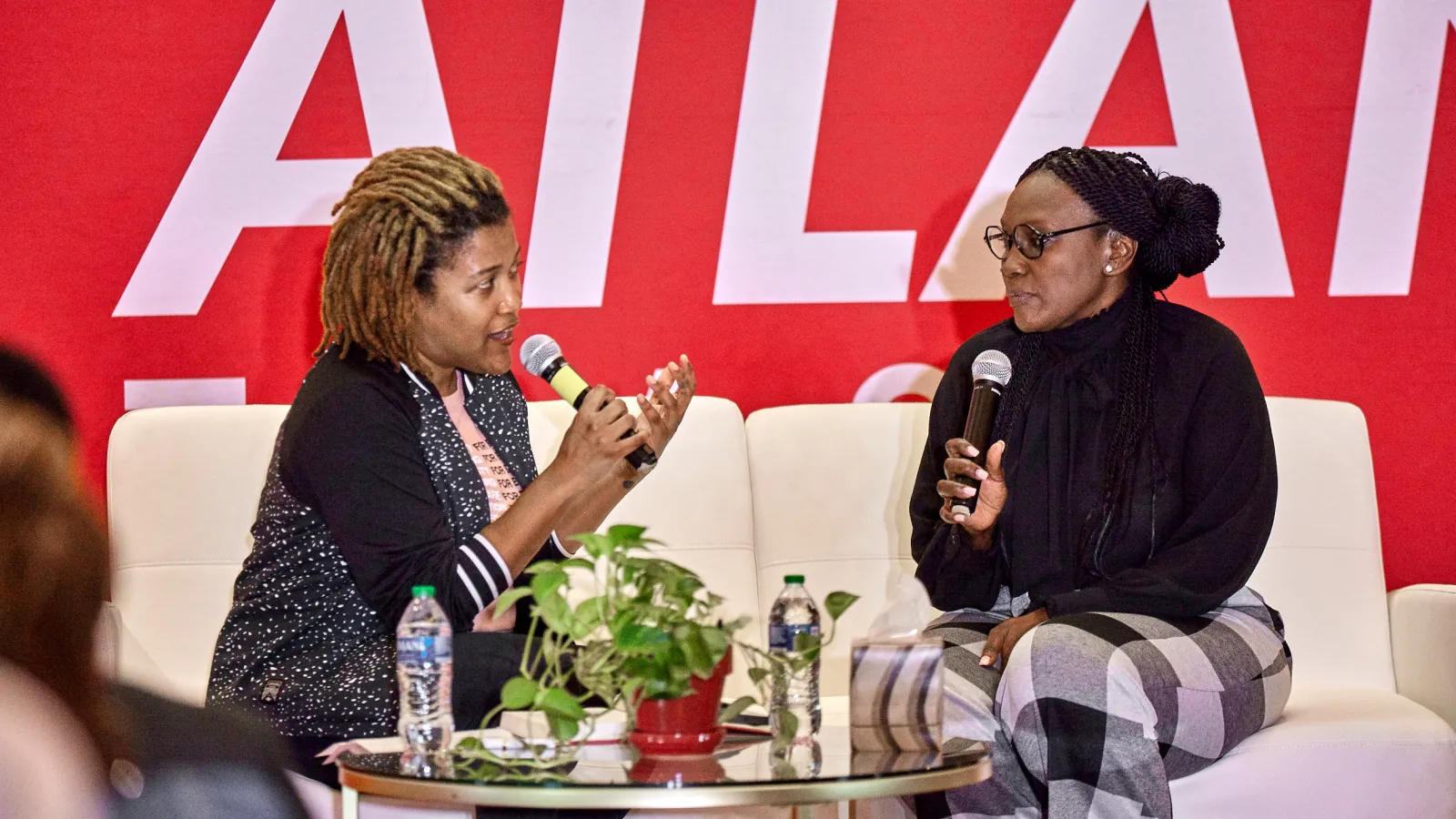
Run with Maud 5K Run/Walk the Latest Step in a Journey for Atlanta Track Club
As Atlanta Track Club
began its final week of preparations for "America's Marathon
Weekend," a celebration of running that included the 2020 U.S. Olympic
Team Trials - Marathon, a black man was gunned down while on a neighborhood run
in Brunswick, another Georgia city less than five hours down the road.
The walk/run was announced last week at a Community Conversation between Alison Mariella Désir, author of "Running While Black," and Wanda Cooper-Jones, the mother of Ahmaud Arbery.
In introducing the discussion the next evening, Rich Kenah, CEO of Atlanta Track Club, recounted how for years he had been touting running and walking as, unlike many other sports, a fitness option available to everyone. In 2020, "I learned … it was a myth. And the track club has been on a journey to talk about this myth, to move forward as a community - an Atlanta community, a running community - to address and to talk about something that I just really never understood: this thing that is "running while black."
Days after the video began circulating, the Club began to break -
although not without internal debate - with its longtime policy as a non-profit
organization of remaining apolitical, even in the face of the high-profile George
Floyd and Breonna Taylor deaths. "But when Ahmaud was killed while running, we
made the decision to invest ourselves because we do not believe that, at its
core, this is a political situation. This
touches the running community directly," explained Kenah.
First came a social media post, on May 8, that read in part: "The shooting death of Ahmaud
Arbery made all too painfully clear the fear and risks that can be felt by
black runners every day. … Today, Atlanta Track Club encourages you to run 2.23
miles in memory of Ahmaud and in solidarity with the belief that everyone has
the right to run."
In early June, it went a step further in an email to its members
from Kenah, which concluded with this paragraph:
"As
Executive Director of one the best running organizations in the country in the
most diverse running city in America, it is important that you hear from
me now. The Club stands in solidarity with and as part of the fight against
racism, and I believe that Black Lives Matter. I hope that this belief is
widely shared by all of you. I pledge to return to you with specific details of
Atlanta Track Club's short- and long-term action plans in this struggle for
progress."
The response was overwhelmingly supportive. But there were
exceptions.
"I am very disappointed that you feel the need to make such a
naked effort at virtue signaling when the ATC has nothing (and should have
nothing) to do with public discourse," replied one member, in part. Several
others asked to cancel their memberships.
On July 21, 2020, the Club announced an initiative called Common Ground, a
program to educate and inform its staff, leaders and members on issues of
social justice and anti-racism. As part of the initiative, the Club gave
benches made of recycled water bottles from the 50th Running of the
Atlanta Journal-Constitution to local organizations to be used for
conversations about the history and impact of systemic racism in the U.S. and
listening to ways it might be dismantled.
"Following the murder of Ahmaud Arbery and far too many
others, silence and complacency is unacceptable," said Kenah in making the
announcement. "Today, we commit to being an anti-racist voice and that begins
with listening."
In the months that followed, the Club conducted, and posted
on YouTube, more than two dozen conversations with community leaders involved
in running. In December 2021, it published a Common Ground Report that summarized what it learned.
Last year, the Ahmaud Arbery Foundation approached the Club
about partnering on a run/walk to raise funds in support of its mission to
support the mental wellness of black boys. The event was announced on February
24, just three years and one day after the murder, by Cooper-Jones during the
Community Conversation held in The Stave Room, an event facility adjacent to
Atlanta Track Club headquarters.
Before an audience of invited guests, Désir -
whose book was born out of hearing about Arbery's murder just seven months after
giving birth to her own son - read from the opening lines about taking extra
precautions in what she was about to wear on a run so that she would obviously
look like the archetypal runner. She chose a shirt, she wrote, "that screams
"I'm running. Don't shoot!"
Désir explained that she chose that passage because some said -
even during the trial of his attackers - that wearing khaki shorts and white
T-shirt, Arbery did not look like a runner.
"At the time of his murder, Ahmaud was having some mental
issues," said his mother. "So Ahmaud sometimes would run with just any type of
attire. He could have on shorts, he may have on jeans. If he felt like running,
he would run."
When her son was young, Cooper-Jones said, he had been
involved in football and basketball, but didn't start running until he began
facing mental heath challenges as an adult.
"I felt like when he began to run, Ahmaud felt like he was
free," she said.
Among those in the audience was three-time Olympic medalist
Gail Devers, who said afterward that she knows how good it feels to be able to
go for a run when the walls are closing in.
"It's not a pair of shoes, or an outfit, that determines if
you're a runner," she said. "Was he running? Is he a runner? If he was out
there running, he was a runner."

Asked what she hoped the audience would take away from the
evening's conversation, Désir said that in addition to seeing
Cooper-Jones' humanity, she hoped that people realize everyone has the
responsibility for making sure that running is safe for all people. "If we're
busy waiting for somebody else to do something," she said, "then nobody acts."
Tes Sobomehin Marshall was among the other invited guests to
the event. A race director, founder of
runningnerds and
longtime Atlanta Track Club member, Marshall also participated in one of the Common
Ground discussions.
She called the Club's partnership with the Ahmaud Arbery
Foundation "huge," and commended it for supporting Atlanta's black running
community. But, Marshall added, "I don't think Atlanta Track Club can be the
all-out leader on issues of race, because it's not a race-based organization."
Kenah agrees. "I am hyper-conscious of our mission, and that is
to make Atlanta healthier through running and walking. Running is our DNA, and
being an advocacy group for issues other than that was not and is not who we
are," he said. "But the intersection of race and running cannot be ignored. So
we look forward to this collaboration with the Ahmaud Arbery Foundation so that
Running City USA lives up to our hopes and expectations of being the safest,
most welcoming running community in the country."

